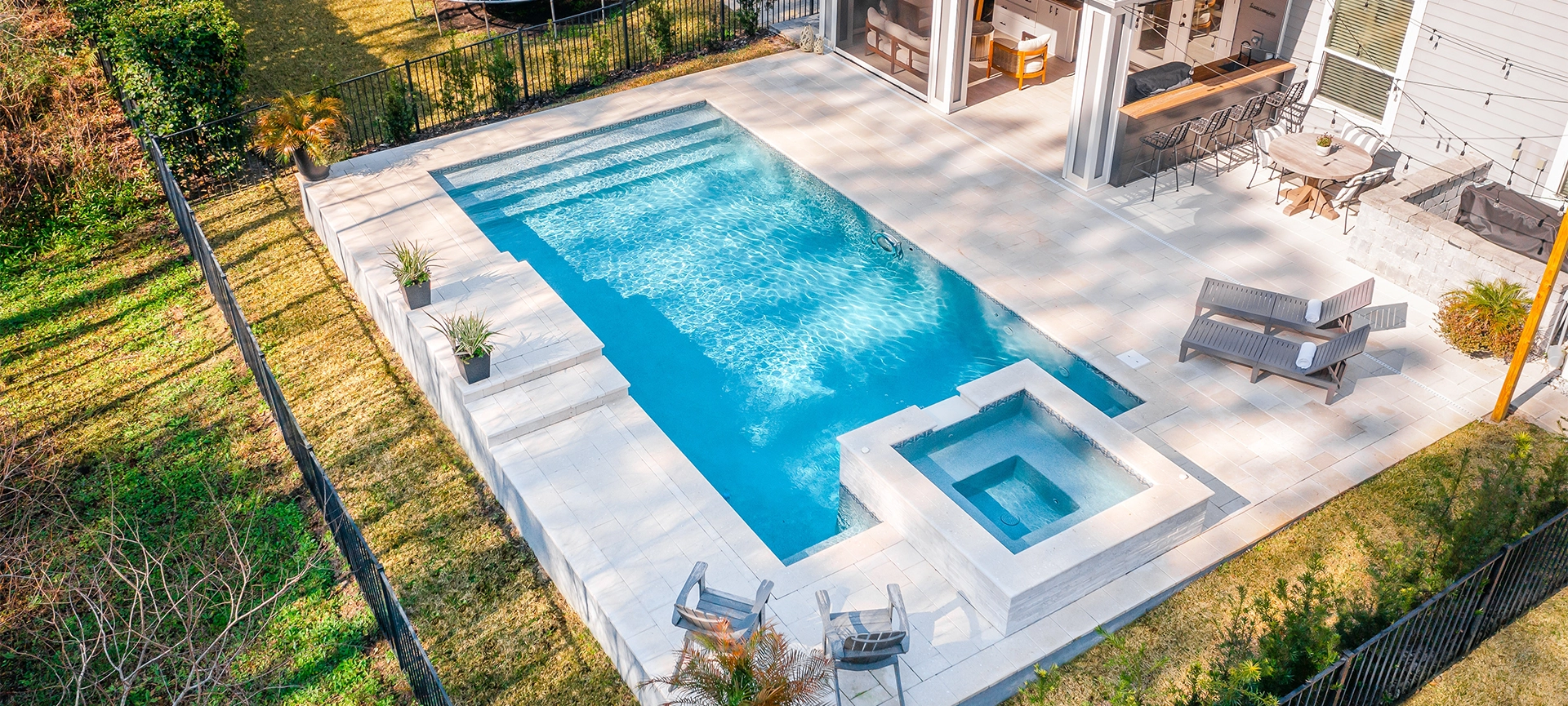Pool Permits & Hidden Fees for Toronto Homeowners

Adding a pool can transform a backyard, but in Toronto, the path to construction comes with rules that many homeowners do not see at first glance. Permits, zoning limits, drainage checks, and enclosure requirements all influence how your design takes shape and how long the approval process lasts. This is where custom pool planning becomes essential because it helps you design a pool that fits your yard, meets every regulation, and avoids costly revisions.
Some expenses are easy to plan for, while others appear once drawings are submitted or once the site is reviewed.
A clear understanding of these steps helps you budget with accuracy and avoid last-minute issues that slow construction. This guide walks you through what to expect so you can move forward with a pool project that is planned, compliant, and ready for a smooth build.
Why Toronto Requires a Pool Permit
A pool changes how a property functions. Toronto requires a permit to ensure safety, drainage control, and correct placement. The city reviews everything from fence height and distance to property lines to how the new build affects neighbours.
Permits also help verify that contractors follow safe construction standards. Working with a professional team means these checks are handled correctly from the start.
Related Article: Top 5 Mistakes to Avoid When Installing a Pool in Ontario
What the Permit Covers
A pool permit in Toronto covers more than the pool itself. Each application goes through several technical reviews to confirm the design meets local safety and property standards.
A complete permit review usually includes:
- Pool location to confirm the build fits within the usable area of your yard.
- Setbacks from property lines to ensure a safe distance from neighbours, structures, and shared boundaries.
- Pool enclosure plans including fence height, gate hardware, and self-closing mechanisms to meet safety regulations.
- Soil and excavation details that check ground conditions, excavation depth, and any support needed for safe construction.
- Site grading and drainage plans to show how water will move across your yard once the pool is installed.
- Mechanical and electrical components if your design includes pumps, heaters, lighting, or any connected systems.
Most homeowners expect these checks, yet the cost of reviewing each element varies based on property conditions, engineering needs, and how many revisions are required. Fees often increase when drawings need updates, when drainage plans require additional engineering, or when the project triggers zoning or utility reviews.
Clear drawings and an experienced contractor help streamline this process and reduce repeat submissions.
Standard Permit Fees You Should Expect
Toronto has fixed fees for pool-related applications. These typically include:
- Pool enclosure permit
- Zoning review
- Committee of adjustment fees if a variance is needed
- Site plan or grading review fees
These fees vary by property size and complexity. Smaller urban lots with tight setbacks usually require more review. Larger yards may have a simpler process, but they still go through the same approval steps.
Related Article: Inground Vs Above Ground Pools: Pros, Cons & Costs

Hidden Fees That Homeowners Often Miss
Many homeowners underestimate this part of the budget. Beyond the main permit, several fees can appear depending on your yard conditions and local rules.
1. Tree Protection and Arborist Reports
Toronto has strict rules on protected trees. Even if the tree is on a neighbour’s lot, excavation near the root zone can trigger:
- Arborist assessments
- Tree protection plans
- Security deposits for tree preservation
These costs rise if removal is requested, and approval is not always granted.
2. Additional Grading Plans
A standard grading plan may be enough for simple lots. Sloped properties, corner lots, or yards with tight drainage paths may require:
- Additional civil engineering reports
- Revised grading drawings
- Repeat submissions
Each revision adds time and cost.
3. Conservation or TRCA Fees
Homes near ravines or regulated zones must follow Toronto and Region Conservation Authority (TRCA) rules. This may include:
- Environmental reviews
- Setback compliance checks
- Special approvals for excavation
These fees are outside the standard city permit cost.
4. Electrical and Mechanical Inspections
If your pool design includes heaters, pumps, or lighting, you may need separate inspections:
- Electrical Safety Authority (ESA) inspections
- Gas line permits for heaters
- Mechanical reviews for systems with higher output
These inspections protect your home but add extra cost.
5. Site Access and Equipment Limitations
Tight urban lots can increase:
- Equipment rental fees
- Labour time
- Soil removal charges
If machinery cannot enter the yard directly, builders may need temporary walkways or smaller equipment, increasing the total cost.
How to Estimate Your Total Pool Permit Costs
Every Toronto neighbourhood has different conditions that shape your final budget. A fair estimate looks beyond the main permit fee and reviews the full scope of approvals and site requirements.
A complete cost breakdown should include:
- All Toronto permit fees for the pool enclosure, zoning review, and any required planning checks.
- Expected zoning approvals in case your layout needs a variance due to tight setbacks or lot shape.
- Tree-related costs such as arborist reports, protection barriers, or security deposits if excavation is close to mature trees.
- Engineering and grading expectations that confirm drainage patterns, soil capacity, and safe excavation depth.
- Required inspections for electrical, gas, or mechanical components connected to lighting, heaters, or pumps.
- Access or excavation challenges caused by narrow side yards, shared fences, or limited equipment entry points.
A good estimate explains how each item affects the timeline and labour involved. When your contractor walks you through these details early, it becomes easier to prevent surprise charges, schedule delays, or last-minute design changes that increase the overall cost.
Related Article: Common Pool Issues and How We Fix Them For You

Why Working With a Professional Matters
Pool projects involve excavation, grading, fencing, and precise construction. Experienced contractors understand local rules, manage paperwork, and prevent costly delays. A crew familiar with Toronto’s permit system can help you avoid common issues such as missed setbacks, incomplete drawings, and failed inspections.
Green Side Up Contracting brings years of experience handling city permits, backyards of all sizes, and outdoor builds that require careful planning. A professional approach helps reduce risk so your pool plan moves forward smoothly.
A Clear Path Before You Build
Knowing what to expect removes stress from the process. With the right support, your pool project becomes a straightforward upgrade instead of a maze of paperwork and surprise costs. Each step you take now protects your budget and keeps construction on schedule.
If you’re planning a pool or any backyard project, Green Side Up can walk you through the permit process and prepare your site correctly. Contact our team and get a quote today so your build starts on solid ground.
Frequently Asked Questions
Can I apply for a Toronto pool permit before finalizing my design?
You can start the process early, but Toronto will not approve the application until the drawings, enclosure plans, and grading details are complete. Starting with a draft set helps identify setbacks and zoning issues before you lock in the final design.
Are temporary above-ground pools exempt from permits?
Most temporary pools under a certain depth do not require permits, but larger above-ground models with ladders, platforms, or permanent enclosures often fall under the same rules as in-ground pools. The city may still require an enclosure review if there is a safety risk.
What happens if I skip the permit and build the pool anyway?
Unpermitted pool construction can lead to stop-work orders, fines, mandatory demolition, and future issues when selling the home. Real estate lawyers often check for missing permits during transactions, which can create major delays.
Do pool permits transfer to the next homeowner if I sell the house?
Yes. Once a permit is approved and the final inspection is complete, the record stays with the property. This gives buyers confidence that the pool meets Toronto’s safety and drainage requirements.
Can my homeowners’ insurance be affected if the pool is built without proper permits?
Yes. Many insurers require proof of compliance. If a claim involves an unpermitted pool, coverage may be reduced or denied, especially if the issue is related to electrical, access, or enclosure safety.
Are there restrictions on adding pool houses, cabanas, or outdoor kitchens as part of the project?
Yes. These structures often have their own zoning and permit requirements. Adding a cabana, roof structure, or plumbing can trigger more reviews, even if the pool itself is approved. Including all add-ons in the initial plan helps avoid delays.
How far in advance should I start the permit process before construction season?
Starting two to three months ahead helps prevent schedule issues. Spring and early summer are peak seasons, and review times can stretch. Early applications give your contractor room to book excavation dates and avoid mid-season backlogs.
